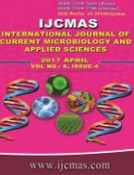


 National Academy of Agricultural Sciences (NAAS)
National Academy of Agricultural Sciences (NAAS)

|
PRINT ISSN : 2319-7692
Online ISSN : 2319-7706 Issues : 12 per year Publisher : Excellent Publishers Email : editorijcmas@gmail.com / submit@ijcmas.com Editor-in-chief: Dr.M.Prakash Index Copernicus ICV 2018: 95.39 NAAS RATING 2020: 5.38 |
The presence of organic sulfur-containing oil in the environment is harmful to animals and human health. The combustion of these compounds in fossil fuels tends to release sulfur dioxide in the atmosphere, which leads to acid rain, corrosion, damage to crops, and an array of other problems. The process of biodesulfurization rationally exploits the ability of certain microorganisms in the removal of sulfur prior to fuel burning, without loss of calorific value. In this sense, we hypothesized that bacterial isolates from crude oil and oil products polluted soils can demonstrate the ability to degrade crude oil and oil products as well as dibenzothiophene (DBT), the major sulfur-containing compound present in fuels. The total sulfur bacteria were ranged from 1.6x104- 2.8x106 CFU g soil-1 on PCA media and 4.1x102- 2.1x106 CFU g soil-1 on basel media (BSM) supplemented with DBT. Those strains which showed great degradation efficiency in case of all investigated hydrocarbons were identified based upon the sequence analysis of their 16S- rRNA. Phenotypic and genotypic examination of the recovered isolates revealed that they belong to the five different genera of Bacillus, Pseudomonas, Rodococcus, Mycobacterium, and Klebsiella. All isolated bacteria showed to be capable of biodesulfurization of oil or oil products, as they were compared to standard strains (ATCC) and were able to grow in minimal mineral medium supplemented with DBT or 2HBP as the sole sulfur and carbon source. The potential application of these isolates for the biodesulfurization of oil and oil products as well as sulfur-containing compound in fuels prior to combustion was discussed. Furthermore, results indicated that using a microbial consortium might have a promising application in petroleum oil technology and could be potentially used in microbial enhanced oil recovery (MEOR).
 |
 |
 |
 |
 |